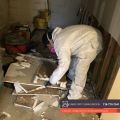Common Areas for Mold Contamination in Your Home

Mold, a common household nuisance, thrives in damp, humid environments and can quickly spread if left unchecked. Identifying the common areas prone to mold contamination is essential for maintaining a healthy living environment. In the San Francisco Bay Area, where the climate can be conducive to mold growth, being vigilant about potential mold hotspots is particularly crucial. Here are some key areas to pay attention to:
1. Bathrooms: Bathrooms are notorious breeding grounds for mold due to high moisture levels from showers, baths, and sinks. Grout lines, caulking, and tile surfaces are particularly susceptible to mold growth if not adequately ventilated and dried after use.
2. Kitchens: Similar to bathrooms, kitchens experience high humidity levels from cooking activities and washing dishes. Mold can develop on food residues, in sink drains, and around refrigerator drip pans, making regular cleaning and proper ventilation essential.
3. Basements: Basements are prone to mold growth due to their underground location and susceptibility to water leaks or flooding. Poor ventilation, condensation on walls and floors, and organic materials like wood or cardboard boxes provide ideal conditions for mold to thrive.
4. Attics: Attics are often overlooked but can be vulnerable to mold infestations, especially in regions like the San Francisco Bay Area with fluctuating temperatures and occasional roof leaks. Improper ventilation, insulation issues, and hidden water damage can contribute to mold growth in attics.
5. Crawl Spaces: Crawl spaces are dark, damp areas beneath homes that can harbor mold if not adequately ventilated or protected from moisture intrusion. Leaky pipes, inadequate drainage, and soil moisture can create a conducive environment for mold growth.
6. Laundry Rooms: Laundry rooms are frequently exposed to moisture from washing machines and dryer vents. Lint buildup, leaks in plumbing connections, and poorly ventilated dryer exhausts can promote mold growth on walls, floors, and behind appliances.
7. Air Ducts and HVAC Systems: Mold spores can circulate throughout homes via HVAC systems and air ducts if not properly maintained. Dust, debris, and moisture buildup within ductwork provide nutrients for mold growth and can compromise indoor air quality.
8. Windows and Doors: Improperly sealed windows and doors can allow moisture to seep indoors, leading to mold growth around frames, sills, and tracks. Condensation on glass surfaces can also promote mold growth if not addressed promptly.
9. Carpeting and Upholstery: Carpets, rugs, and upholstered furniture can trap moisture and organic matter, providing an ideal breeding ground for mold if not cleaned and dried thoroughly. Flooding or water damage can exacerbate mold growth in these materials.
10. Wall Cavities and Ceiling Tiles: Water leaks from plumbing or roof issues can result in hidden mold growth within wall cavities, behind drywall, and above ceiling tiles. Discoloration, peeling paint, or musty odors may indicate mold presence in these concealed areas.
In the San Francisco Bay Area, where mold growth can be influenced by the region's unique climate and housing conditions, proactive measures such as regular inspections, moisture control, and proper ventilation are essential for preventing mold contamination in residential properties. Professional mold inspection and testing services, such as those offered by Bay Area Mold Pros, can help homeowners identify and address mold issues effectively, ensuring a healthy living environment for occupants.
Bayareamoldpros is a leading mold inspection and mold testing company providing quality mold analysis services and helping families & businesses overcome the devastating setbacks caused by mold. Visit our website bayareamoldpros.com either email us or fill in the contact form on our website.We can be reached 24/7 at (650)762-6228. Bay Area Mold Pros suggests that every homeowner in the San Francisco area should get periodic mold inspection services.



